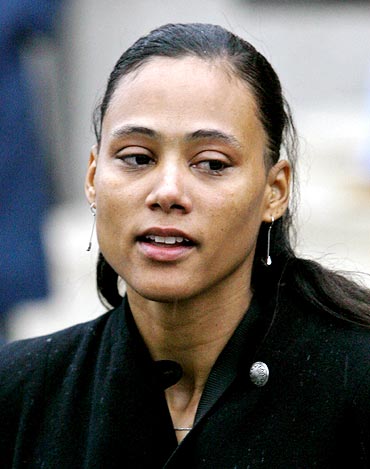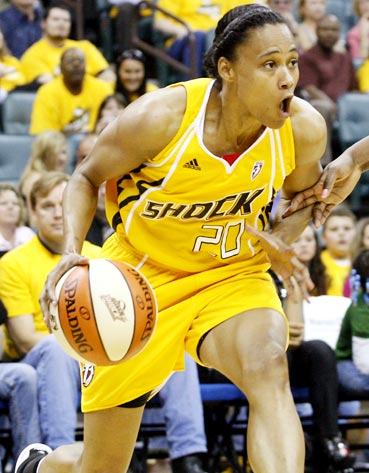 | « Back to article | Print this article |
'I've paid the consequences for my lie'
Disgraced Olympic sprinter Marion Jones apologizes repeatedly in a new memoir over the doping scandal which ended her Olympic career, but she doesn't expect her staunchest critics to ever see the "big picture."
"I can help one million kids not make bad decisions in their lives, and those critics will still be talking about performance-enhancing drugs because that's the bubble they live in," said Jones, who is opening up in her book "On the Right Track" and a new TV documentary on US sports channel, ESPN.
"I've paid the consequences for my lie, and now I want to help people not make certain choices," she said.
Photographs: Reuters
A smiling face that was perfect for television
Jones won three gold and two bronze medals for the United States at the 2000 Sydney Olympics, where she was the golden girl of the Games with a smiling face that was perfect for television. But she was forced to return the medals after admitting she lied about using performance-enhancing drugs, though she has never admitted to knowingly doing so.
"On the Right Track," just published by Simon and Schuster imprint Howard Books, traces Jones' fall from grace -- including a six-month prison sentence and 48 days in solitary confinement stemming from a fight with a fellow inmate -- and her comeback as a professional basketball player.
A documentary, "Marion Jones: Press Pause," will air November 2 on cable's ESPN network.
Once hailed as the fastest woman in the world, Jones for years claimed she was not doping. In 2008, however, she admitted lying to investigators when denying that she knowingly took the banned substance tetrahydrogestrinone (THG) before the 2000 Olympics. She was sentenced to six months at Carswell federal prison in Fort Worth -- a women's prison that she writes could "deaden the spirit."
"I'm the type of person, I like to be in control. I like to know what's going on and I like to prepare," she said. "In terms of perks, I certainly got none."
Her husband Obadele Thompson, a former Olympic sprinter, visited her often, but Jones did not allow her two children because she didn't want them to see their mother behind bars.
Jones learned how to bake in prison
Jones describes prison as violent and filthy, but also where she bonded with some of her fellow inmates and learned how to bake. Shortly into her sentence, she writes that she was attacked by a fellow inmate in a dispute over laundry duties.
"I felt like my life was in danger. And I just lost it. I hit her in the face with my cooler and kicked her in the ribs," she writes.
While Jones says she fought in self-defence and suffered no injuries, the other woman was "bruised and bloody." Jones was given more than a month in "the hole," or special housing unit, which she writes was, "like the next stop to hell."
Since her release from prison, Jones gives inspirational talks where she advises young people to "take a break" before making a potentially bad decision, and she said she is using her book tour to advocate for prison reform.
"Because I lived it and I lived with those women, I realize that they are not being given the resources to succeed when they are released," she said.
Jones, who at 35 still has an athlete's physique, also wants to revive her sports career. In March, she signed a contract to play with the WNBA's Tulsa Shock.
"I have reached the pinnacle of my track and field career," she said. "Now I am trying to get to the pinnacle of my new sports career -- basketball."
"I don't think I've realized my potential in this sport yet," she said.

© Copyright 2025 Reuters Limited. All rights reserved. Republication or redistribution of Reuters content, including by framing or similar means, is expressly prohibited without the prior written consent of Reuters. Reuters shall not be liable for any errors or delays in the content, or for any actions taken in reliance thereon.


